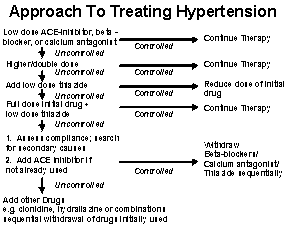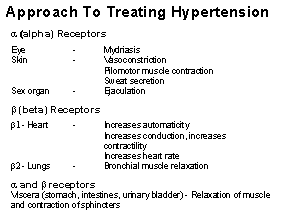|
 
|
  |
Beta
Blockers
- Block beta-adrenergic
receptors, hence decrease heart rate and cardiac output
- Selective beta-blockers have actions chiefly on the heart rate (beta-1
receptors)
- Non-selective
- Propranlol�Selective
- Atenolol, Metoprolol
|
Atenolol
- Selective
beta-1 receptor blocker
- Decreases heart rate (negative chronotrophic action)
- Decreases myocardial contractility (negative ionotrophic effect)
- Decreases cardiac work load
- Useful in IHD
- Decreases cardiac output
- Useful in hypertension
- Decreases conduction
- Useful in arrhythmias
|
Atenolol In
Hypertension
- Negative
chronotropic & inotropic action ----> decreases cardiac output
- Decreases renin activity
- Usual dosage 25-100 mg O. D.
- No adverse effects on foetus; suitable for hypertension in pregnancy
/ pre-eclampsia
|
Atenolol
In IHD
- Decreases
cardiac work load ----> decreases O2 requirement
- Decreases contractility, heart rate ----> decreases diastolic filling
time ----> decreases coronary blood flow
- 50-100 mg daily improves exercise capacity, prevents anginal attacks,
reduces nitroglycerin requirements
- After myocardial infarction, atenolol administration prevents further
damage
|
Pharmacokinetics
- Absorbed
from G. I. Tract (50%)
- Peak plasma levels : 2-4 hours
- Half life : 6-8 hours (Propranolol : 3-5 hours)
---> once daily dosing
- Crosses placenta is excreted in breast milk
- Does not significantly cross blood brain barrier
- Excreted unchanged in urine/stools
|
Other uses
- Arrhythmias
- Alcohol withdrawal
- Hyperthyroidism
- Migraine
|
Tolerability
- Well tolerated
- Selectivity of action
- Headache, dizziness, fatigue, bradycardia, cardiac failure
|
Advantages
over Propranolol
- Atenolol
is selective; propranolol is a non selective beta blocker. Thus�adverse
effects related to beta-2 receptor blockade (e.g., bronchospasm) are
avoided�
- Once daily dosing convenience with atenolol�
|
Salient Features
- Selective
beta-1 receptor blocker�
- Beta-1 receptor blockade results in lower myocardial contractility
and heart rate�
- Decreased cardiac output and blood pressure; useful in hypertension�
- Decreased conduction; useful in arrhythmias�
- Well absorbed orally, convenient once daily administration�
- Better tolerated than non-selective beta-blockers; can be administered
to asthmatics
|
|



